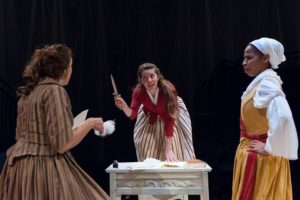The Revolutionists: How far have we come?

The Revolutionists Photo A. R. Sinclair
The Nora Theatre Company at the Central Square Theatre in Cambridge, MA is currently presenting The Revolutionists, a work by Lauren Gunderson that takes place in Paris during the Reign of Terror (1792-1793), a period of the French Revolution during which the leaders of the new government took revenge against those viewed as anti-revolutionists. The situation worsened when the government split into two factions, the Jacobins and Girondins. Of the two the Jacobins were the more vicious. Arrests, quick trials, and the guillotine were the order of the day.
Four “badass” women, as they refer to themselves, are with one exception historical players in the event. Although the lower and middle classes benefitted from the Revolution which in theory granted them liberty, equality, and fraternity, the female half of society won nothing.
There were women who tried to participate in the new revolutionary society, but for the most part they were thrust down. Perhaps the most well-known is Olympe de Gouges (Lee Mikeska Gardner), a playwright and advocate for women who wrote “The Rights of Women and the Female Citizen.” Another activist in The Revolutionist is Charlotte Corday (Eliza Rose Fichter), known for her murder of Jean-Paul Marat, a Jacobin. Corday whose sympathies lay with the Girondins came to Paris to avenge the party she supported. The third historical figure is Marie Antoinette (Celeste Oliva) hated by the people and the victim of scandalous rumors. Lauren Gunderson has written her sympathetically, while still retaining a certain silliness, exemplified by the queen’s enormous hairdo, at least a foot and a half in height. Oliva plays her with complexity; sometimes she shows hauteur, at others, warmth. Marianne (Alexandria King) is a symbolic character, a former slave in Haiti who came to France as a spy. Haiti colonized by the French in the 17th century had started its own revolution against France in 1791. Marianne is an iconic name in French representing freedom and the country’s democratic values.
The play is written in idiomatic American English except for the occasional French word or expression, which is generally mispronounced in the production.
The Revolutionists takes place in a room in Olympe de Gouge’s house where she sits at a desk struggling to write a play. She interacts with the characters she is developing who talk to her, confide in her and tease her, telling her that the work will be meta. Not only is it meta, it is comic, especially in the first act. Charlotte Corday wants de Gouge to write her a line to use as she assassinates Marat. When Marie Antoinette enters to the surprise and awe of the other characters, she demands a rewrite.
In act two, the women live in fear knowing that they will be arrested, judged, and guillotined. Ominous sounds are heard outside; people being taken away, footsteps approaching the door. There is a mimed scene with Charlotte Corday on the scaffold. De Gouge decides to destroy her play, but is talked out of it by the character of Marianne. At the end, only Marianne remains.
Director Courtney O’Connor chose to use an arena stage as the playing area. The constant turning and moving this style of theatre forces on the blocking can detract from the audience’s enjoyment by making it hard to see and hear.
Abby Shenker’s set is minimalist with a platform in the center. The furniture consists of de Gouge’s desk and chair at one side and two chairs on the other. Around the platform is a parquet floor in bad condition, perhaps meant to represent de Gouge’s poverty. Hanging from the ceiling are a dozen lit chandeliers, which dim with each death.
Elizabeth Rocha’s costumes do not fully designate a particular period. It is unclear why Olympe de Gouge is barefoot throughout.
Over two hundred years after the reign of terror, women have still not gained equality in our society. For that reason alone, this play is meaningful and worth seeing. However, Lauren Gunderson who likely identified with Olympe de Gouge is at the moment the most produced playwright in the U.S. according to the magazine American Theatre.
The Revolutionists continues at the Central Square Theatre in Cambridge, MA until November 12, 2017.
Reviewed by Jane Baldwin Photo A.R. Sinclair
Director: Courtney O’Connor
Scenic Designer: Abby Shenker
Costume & Properties Designer: Elizabeth Rocha
Sound Designer: Elizabeth Cahill
Cast
Olympe de Gouge …………….. Lee Mikeska Gardner
Charlotte Corday ……………… Eliza Rose Fichter
Marianne ……………………… Alexandria King
Marie Antoinette ……………… Alexandria King